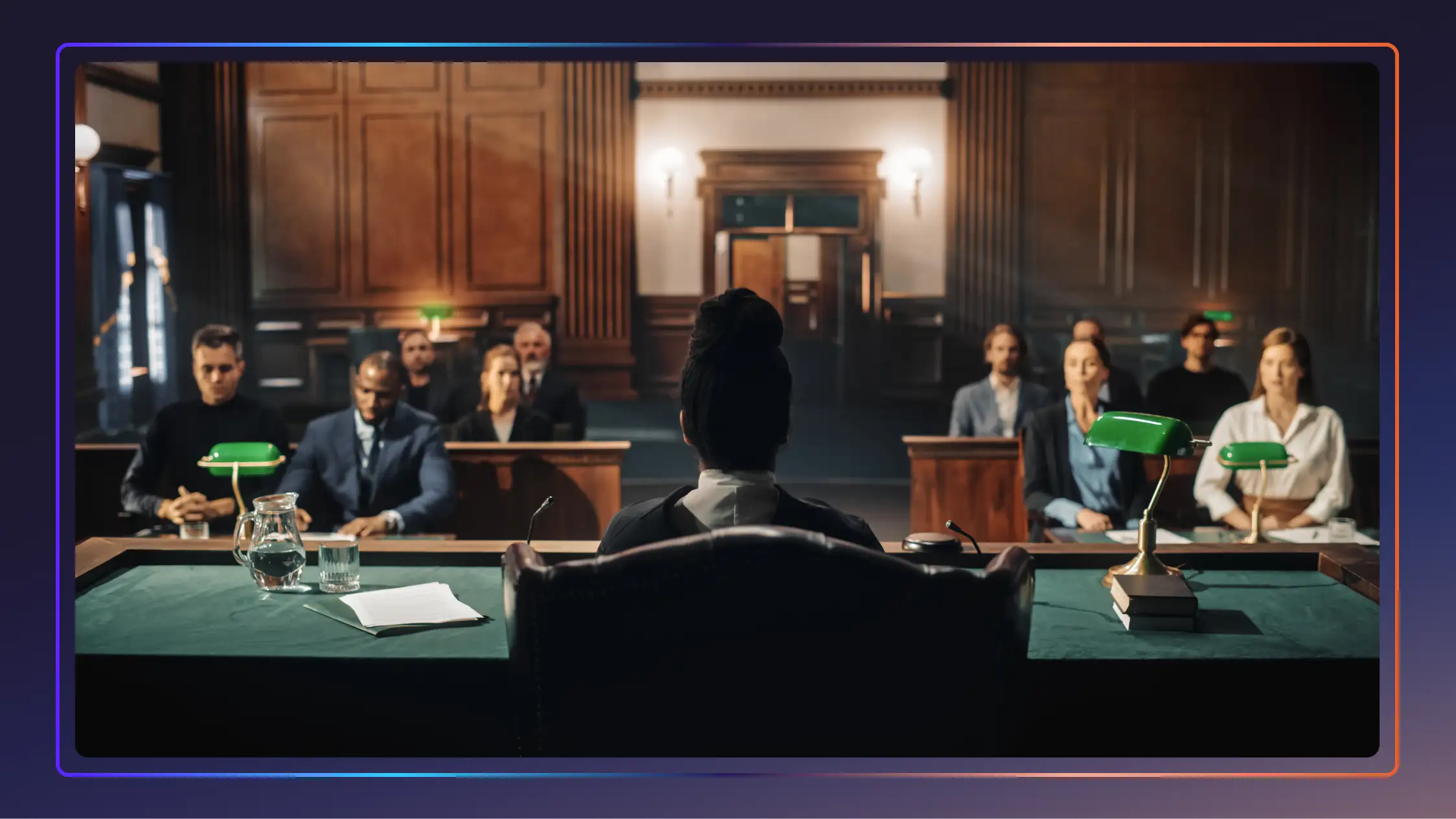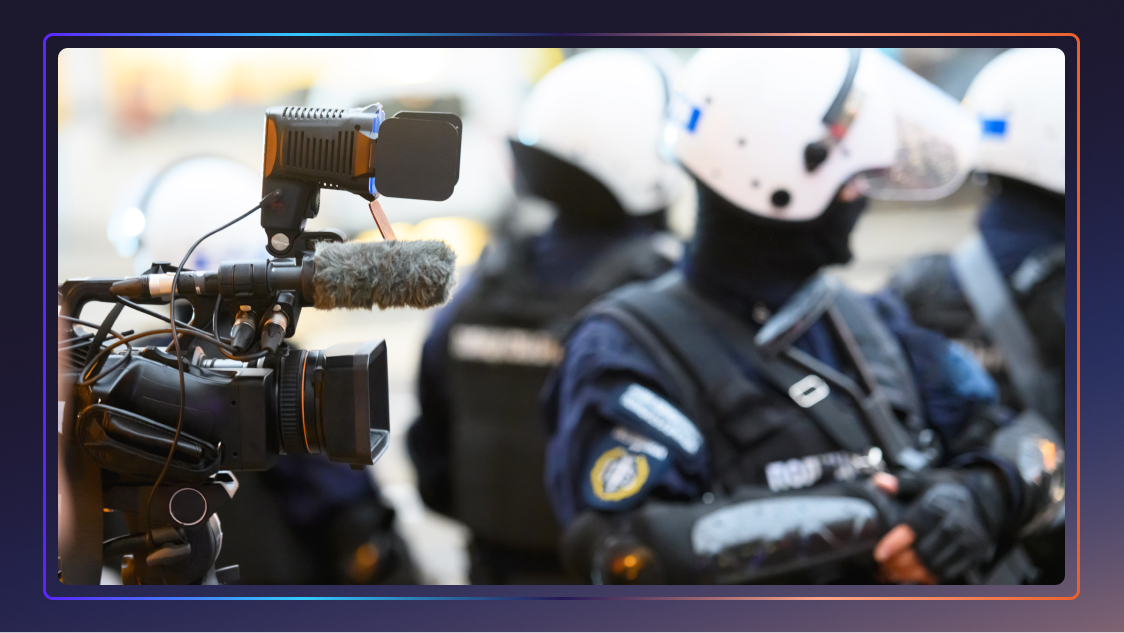Investigative Transcription 101
Rev’s Investigative transcription 101 discusses transcription and how it applies to a number of jobs from criminal cases to investigative journalism.

There’s a certain romance that comes with the term “investigator.” Fedoras, trench coats, long stakeouts, and confrontations immediately spring to mind. In reality, the vast majority of an investigation takes place at a desk, sorting and organizing documents and files, and searching for relevant information. This is why investigative transcription is so helpful to an investigator, whether they wear a rumpled trench coat or not.
With everything from office meetings to court depositions to package delivery being recorded these days, investigation often involves combing through hours of video. And when you’re looking for specific information that could crack a case, shortcuts like the “skip” and “fast-forward” buttons just aren’t that usable. In fact, video review is often the most time-consuming part of any investigation.
One of the main ways to save time is with investigative transcription, which turns any audio or video recording into a scannable, searchable text document. Suddenly, those months of wire-tapped phone calls seem manageable!
What Is Investigative Transcription?
Investigative transcription is the act of turning audio and video recordings into text specifically for investigative purposes. Anything from surveillance video to wiretaps to recorded court depositions can be turned into text by a reliable investigative transcription service.
Since so many video and audio transcription investigations involve legal issues, transcription accuracy matters. It’s vital to choose an investigative transcription service that offers accurate ASR like Rev, which boasts an industry-leading 99% accuracy rate for ASR.
Investigative Transcription in Real Life
Investigative transcription is useful for anyone in a fact-finding capacity. Investigation is often conducted by legal entities like law firms, government agencies, and law enforcement. But legal issues aren’t always the reason for investigation. Journalists, researchers, and even fiction writers conduct investigation for any number of reasons.
No matter what reasons or in what capacity the investigation is happening, there’s a good chance that investigative transcription will make the job easier. Here are a few prominent fact-finding occupations that benefit from investigative transcription.
Lawyers
Given the sheer volume of documents that law firms deal with every day, there’s a good chance that lawyers benefit most of all from investigative transcription. Combing through reams of files, emails, and recordings during the course of an investigation is a great way to experience lawyer burnout, so anything that can streamline that process is welcome.
Tools like Rev can convert hours of recorded conversations into searchable archives, which can eliminate hours spent searching for a single fact or data point. Depositions, for instance, can last days. Rather than reviewing audio recordings on a minute-by-minute basis, investigative transcription makes it possible to find information with a simple query.
There are more ways transcription can help a legal investigation. Court proceedings are usually captured and transcribed by court reporters for ease-of-use. Even dictated case notes can be transcribed to save valuable time and resources. Anything that is recorded in a legal setting can be easily transcribed to aid an investigation.
While lawyers and law firms benefit greatly from investigative transcripts, the use of AI in legal settings can be debated, so be sure to know the laws regarding AI, and then make sure that the transcription service you use values security.
Law Enforcement
Law enforcement agencies use investigative transcription in many of the same ways that lawyers do. Transcribing long depositions and witness interviews, turning unending wiretap recordings into text documents, or dictating and transcribing case notes can make an investigation run smoothly and even help break the case. It’s much easier to search for a specific keyword than to review entire recordings, after all.
Since law enforcement often handles literal rooms full of evidence for a single case, any tool that aids in evidence management can drastically reduce the time spent on a case. Investigative transcription is invaluable for the digital part of evidence management. Searchable transcripts allow law enforcement professionals to quickly find key moments within audio or video recordings during an investigation.
For instance, if an investigator needs to confirm that a suspect received their Miranda warning, they can find out in a matter of seconds with a searchable transcript of the body camera footage. Plus, transcripts allow investigators to avoid watching (or rewatching) potentially disturbing video footage when searching for evidence.
Investigative transcription can also significantly speed up report writing. Once investigators have the key details of a case in text format, they can quickly plug that information into their report saving time better spent on other parts of the case.
Insurance Investigators
Insurance investigators often conduct interviews with claimants and witnesses to get to the bottom of a claim. These interviews can include all sorts of subjects: medical professionals, lawyers, law enforcement, bystanders, subject experts, and anyone else who might have input on a claim. Investigators also often dictate case notes.
In short, there’s a lot of recorded audio and video involved in any insurance investigation. Insurance transcription can save investigators and insurance companies hours of time, and can be applied to investigations for medical insurance, home insurance, liability insurance, and disability insurance.
Private Investigators
Stakeouts and fedoras, right? Well, maybe sometimes. Regardless of the nature of a private investigator’s case, there could be hours upon hours of recorded footage to comb through when it comes time to turn over files to the client. Interviews, case notes, and, yes, surveillance footage can be cumbersome for a client to use and understand.
Transcription of any footage can easily show the entire case in a microcosm: Highlighted passages and summaries make relevant information easily digestible and show the client a job well done.
Pros and Cons of Transcripts in Investigations
Everything has pros and cons, and while investigative transcription can help in so many ways, there are a few drawbacks. Here are the pros and cons of investigative transcription:
- Pros
- Easy information organization. It’s much easier to file and organize information in paper or text documents than with audio or video files. You can’t highlight a passage in a video!
- Searchable text. Searching for a keyword in a text document is infinitely more efficient than reviewing and noting every instance of the word in a recording.
- Efficient sharing and reviewing. Multiple investigators reviewing the same Google doc is far more efficient than passing around audio and video files.
- Cons
- Unreliable accuracy. Not all automated speech recognition is created equally, and inaccurate transcription can sink a case. Since so much of an investigation relies on surveillance footage and interviews, you can never ensure that there will be clear audio.
- Security issues. Unless you’re transcribing your footage yourself, there’s a chance that your sensitive information could be exposed to data breaches. Make sure your transcription services prizes data security!
What to Look For In a Good Transcription Service
Accuracy and security, security and accuracy. We can’t say either word enough! These are the two most important things to look for in an investigative transcription service. When conducting an investigation, your data needs to be accurate, or lives could be at risk.
Imagine if an inaccurate transcription was entered into evidence. Say the ASR misheard a witness’s testimony about time and day, and an alibi was ruined based on inaccurate info. It can’t happen! Rev’s ASR is proven to be leaps and bounds better than the competitors, so you can trust your transcription.
Since the vast majority of investigations are conducted for legal reasons, there’s bound to be sensitive information involved. A transcription service that prizes security is the only way to go. Rev’s compliance certifications and standards include:
- Annual SOC2 Type II Attestation
- Compliance with EU General Data Protection Regulation
- Health Insurance Portability and Accountability Act (HIPAA) compliance*
Investigative Transcription You Can Trust to Do The Job
Whether conducting an insurance fraud investigation, digging into a criminal case, or engaging in investigative journalism, there’s no doubt that investigative transcription can streamline your job. Rev offers transcription that you can trust to be both accurate and safe, meaning you can rest easy knowing that you did your job well and your clients are protected, whether you wear a fedora or not.
Legal Transcription You Can Trust
*HIPPA Compliance is available for enterprise plans only













.webp)


